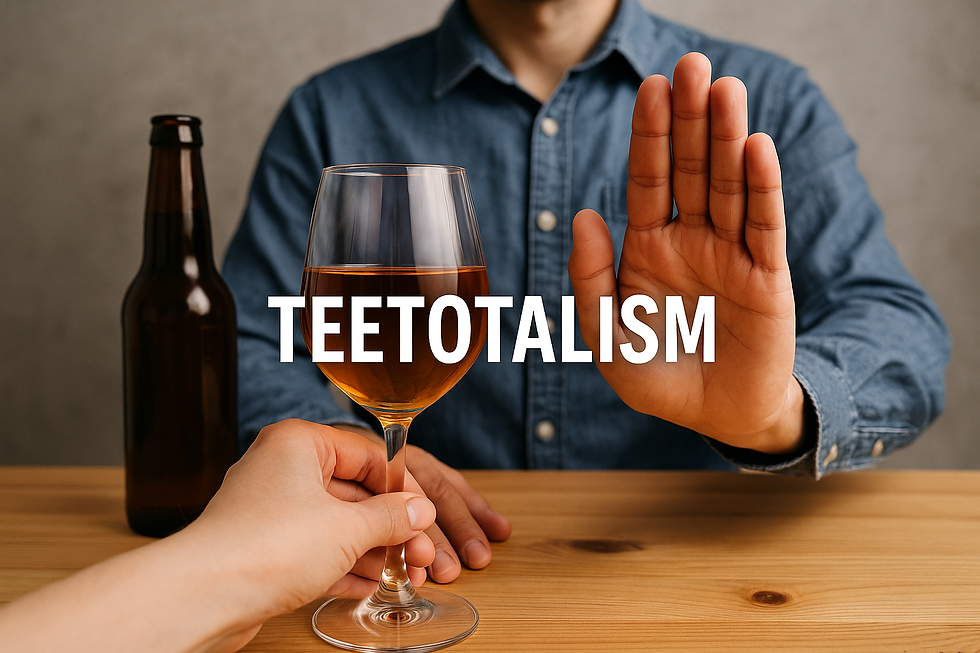Sobriety and the Art of Living
- Andrew Bevan - Voluntary Mentor

- Apr 16, 2024
- 4 min read
Updated: Nov 4, 2024

Following any setback in life, perhaps from illness, grief, or some other form of trauma, the sufferer needs guidance on how to get well. The following set of questions are usually asked. “What should I do in these circumstances?” “What steps can I take?” “Can you give me some advice about the experience of others?”
It is just like this with recovery from alcoholism or some other form of “substance use disorder”. Getting sober, perhaps with supervised detox or medication, is one thing. But staying sober and building another life requires a game plan. We need to draw on the experience of others. We’re all different, of course, but perhaps we can outline some general principles.
The recovery path may require some radical changes in the life of the sufferer. These will include who you mix with, where you go, and what you do. Choices will need to be made and the steps taken will in large part define who you become. You will need to be prepared for the challenge of setbacks and how these test your resolve.
In Greek philosophy – always a source of insight – the question was put somewhat differently. How do I lead a “good life?”
One way for the ancients to approach this question was to look at those who succeed in life. With this in mind, we might ask what it takes to get on in life in the modern world. How do we define success? Is it measured by living in a large, detached house, owning two cars, and having several holidays every year, for example?
When we look at those who have reached the top of the tree, admired by others, we might want to emulate their life choices. Perhaps it required education, training, sacrifice, and commitment, for example. But we don't always have the same opportunities available.
Instead, Epictetus spoke of the “art of living”. His approach was to focus on what is required to “bear well” in life. This is not measured by material success, though the outcome may include such things. Rather, living a good life is about how we fare within ourselves, in our relationships with others, and how we find happiness, peace, and contentment.
The “art of living” well led to a set of precepts with a focus on so-called “virtues”. These involve selflessness, care for others, acting with courage, practising fairness in our dealings with others, and so on. These are seen as character-enhancing. The good life entails living in accordance with the nature of things, informed by reason.
The modern use of the term “virtue” has come to mean something somewhat different, however. It’s applied to the field of morality. Rather than speak of the art of living, it’s used to pose a different set of questions – “what should I do?” “What is right and wrong?” This is all well and good but may lead us up a blind alley, however.
Where are we to find the general principles for living a good moral life? The philosopher Alasdair MacIntyre has written extensively about these issues. The problem is that the debate risks collapsing into moral relativism. In other words, different societies and cultures reach different answers about what is right and what is wrong. Religions provide an answer but raise all sorts of different questions.
Let’s Keep it Simple, as the saying goes. If we return to what the Greeks called eudaimonia (what we now call wellbeing), what are the insights for those seeking to recover from alcoholism and other forms of substance use disorder?
· Acceptance – this emphatically does not mean a “blind acceptance”. It is saying that you can make changes, but you can only change those things which are under your control. Accept that bad things can and do happen – it’s a fact of life.
· Confession – don’t stay in denial. Admit to your suffering and the contribution made by your own behaviour and loss of control.
· Repentance – acknowledge the harm you may have caused to others and ask for their forgiveness.
· Reconciliation – seek the help and support of others. Live your life in community with others who share like-minded aims.
· Don’t worry overly about what others think about you – you can’t control their feelings. If others won’t give you the space to make the changes you need, or are not supportive of your desire for sobriety, then move on.
· Don’t let others impose behaviour on you which will harm recovery – your contract of employment, if you have one, does not say that you must get drunk with colleagues and clients on a regular basis.
· Don’t overreact to situations – don’t catastrophise. Fear, anger, and resentment are emotions which are within your control. Learn the techniques to cope, including meditation and other relaxation techniques. Don’t be tempted to self-medicate when things go wrong, as they will from time to time.
When I sum these up, these are the important things that come to mind from personal experience and working with others. Don’t retreat within yourself – this is a manifestation of denial. You can’t get better on your own. Reach outward, come out into the community, and find shared meaning and purpose in your life with the help of others.
The “art of living” or the pathway to the “good life”, is enshrined in the so-called 12 step recovery programme. It’s not for everybody, admittedly, and some baulk at what they perceive to be a religious dimension. That is even though adherents are ‘not allied with any sect, denomination, politics, organization or institution’. Instead, it provides a set of principles to live by and support you in your recovery.
For more information on staying sober, please contact The OAD Clinic.




Comments